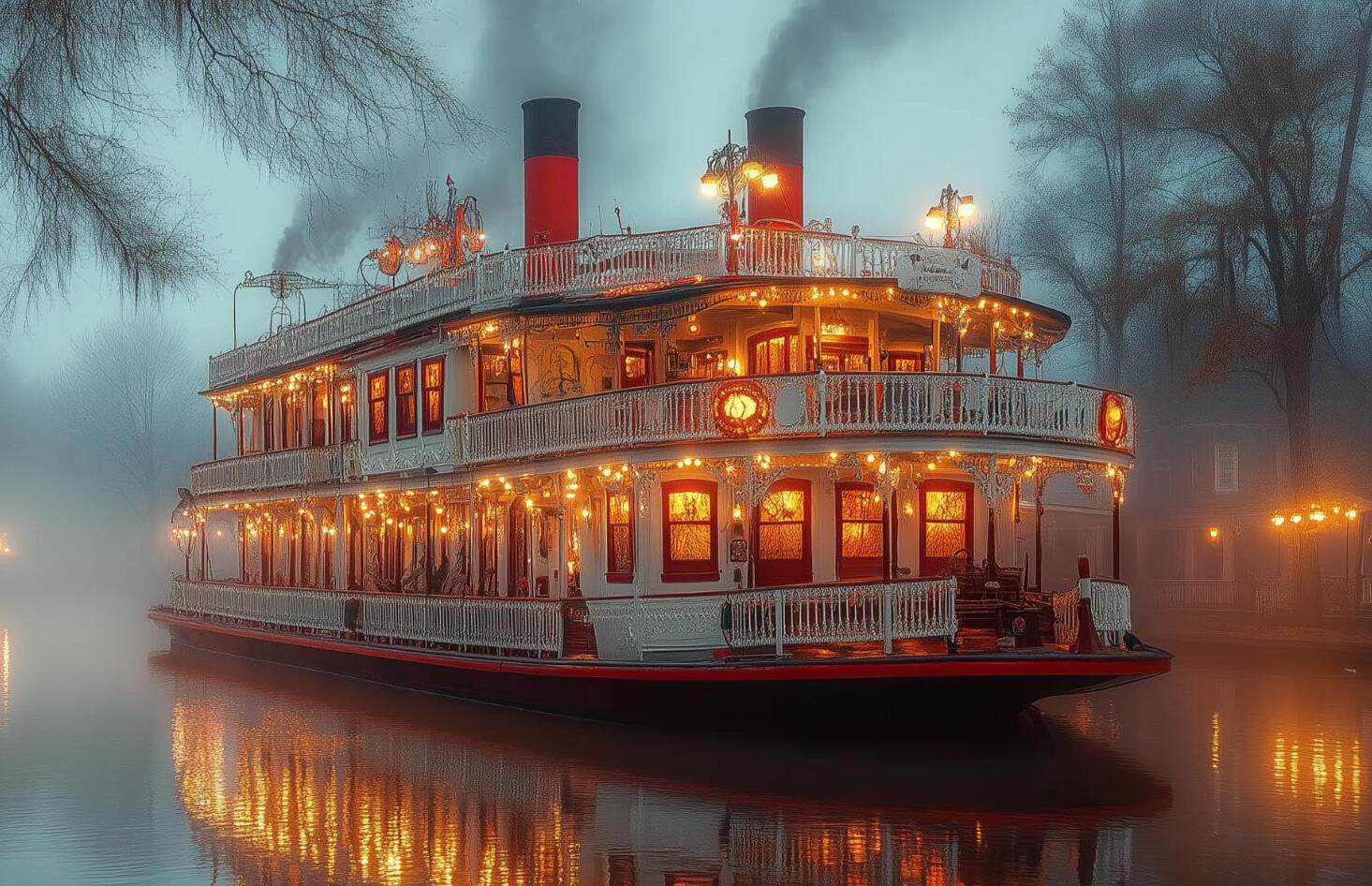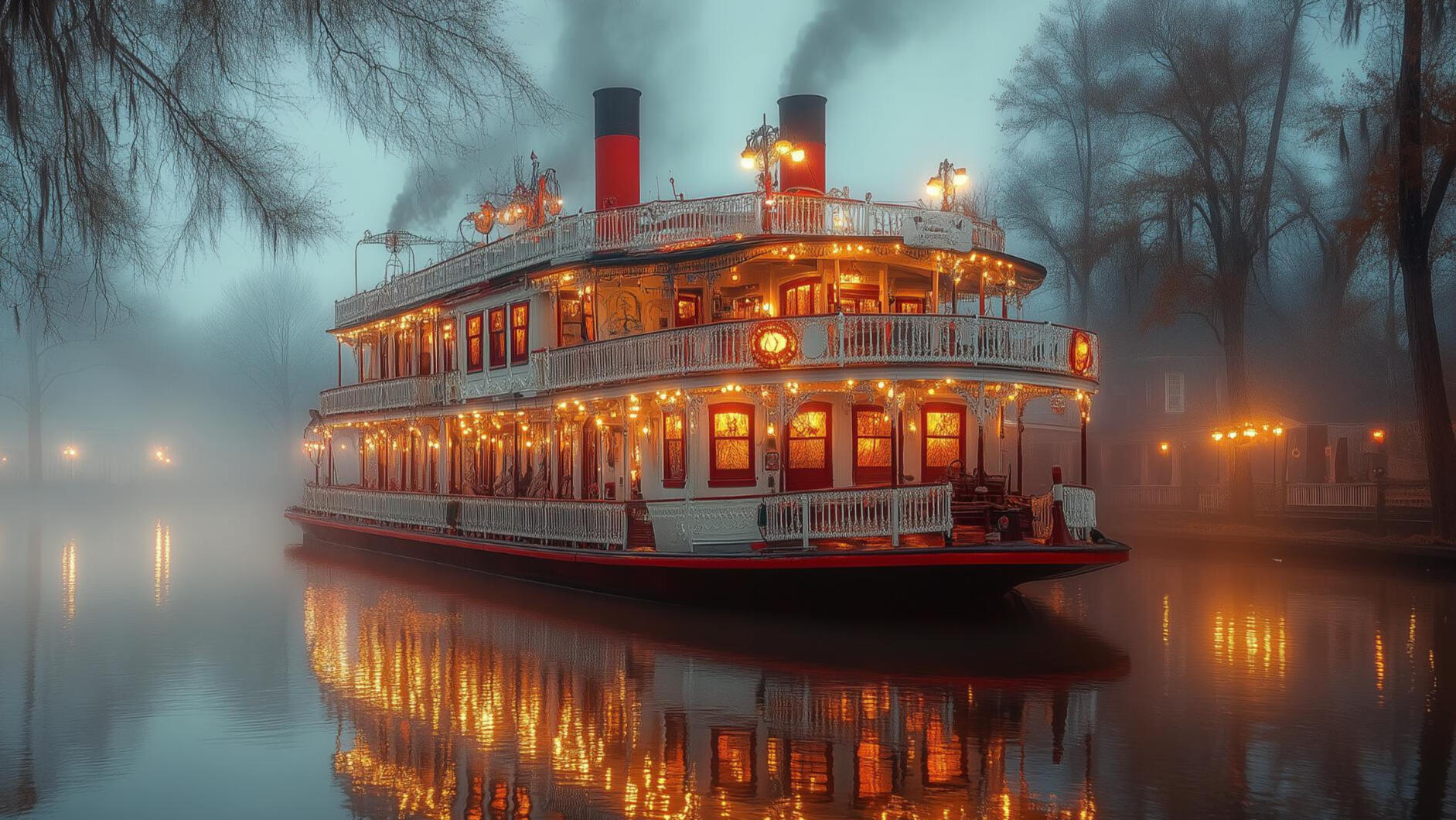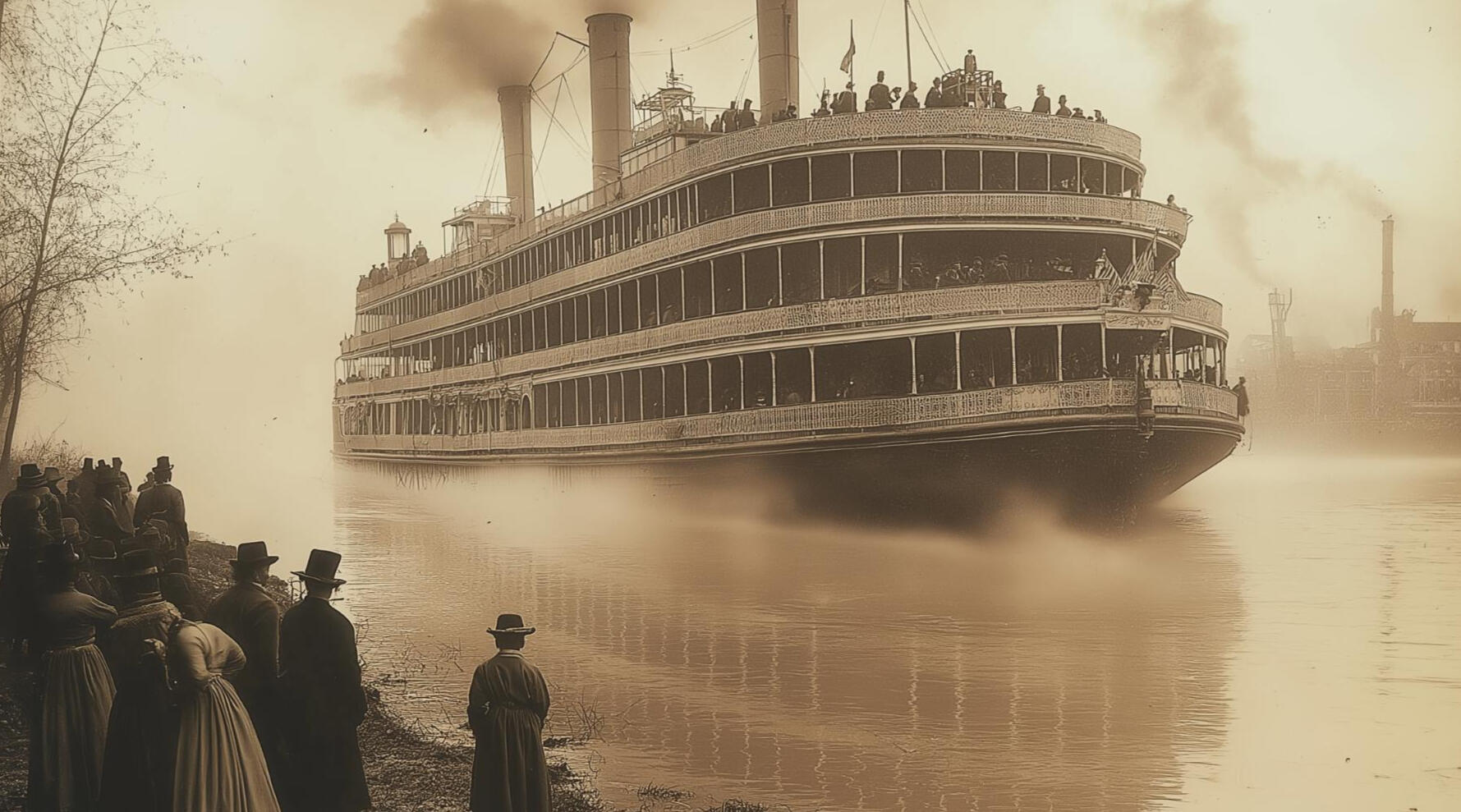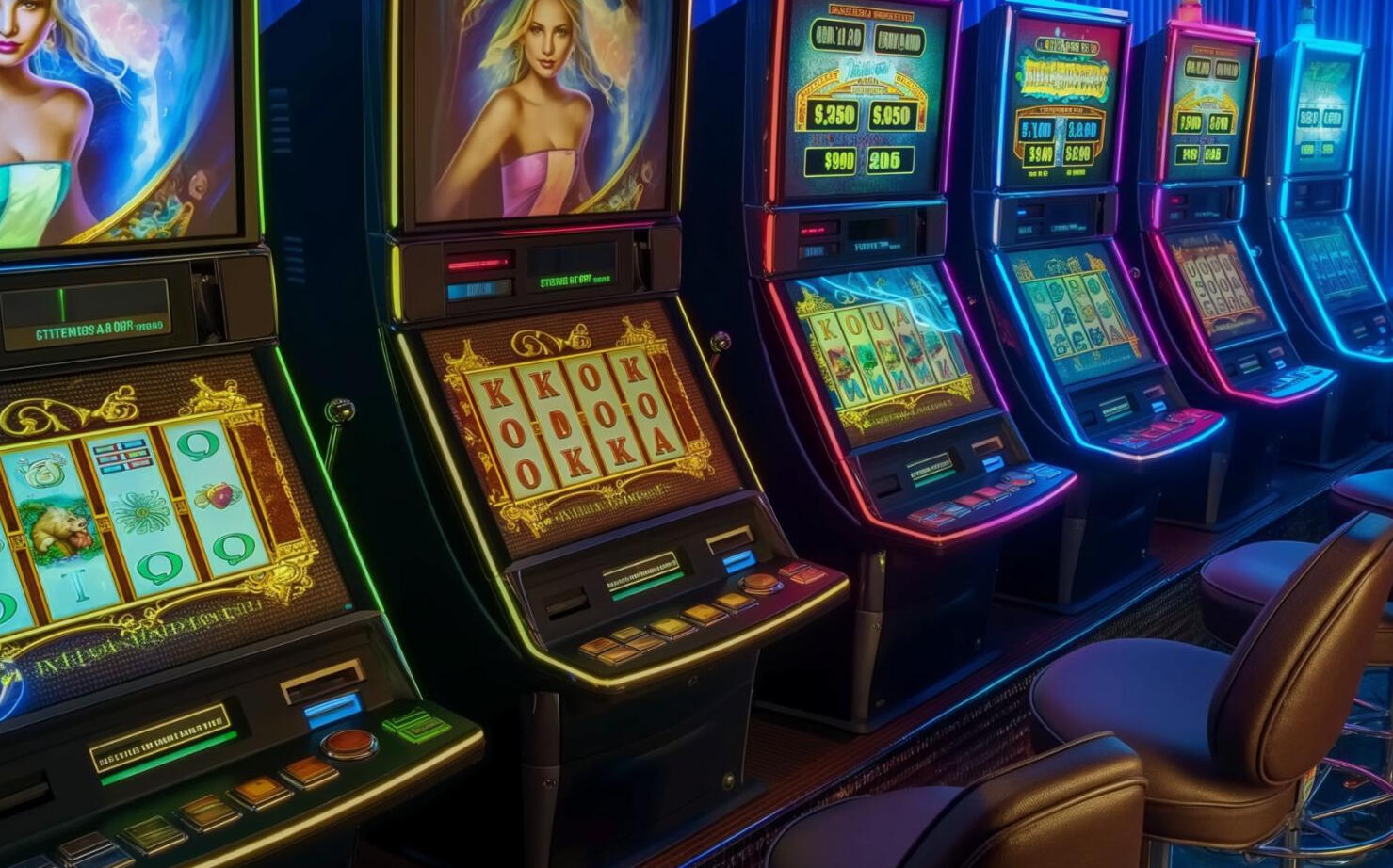The History of Casino Boats
Steamboats, Gamblers, and the Old Mississippi
Casino boats have long captured the imagination of gamblers and travelers alike, offering a unique blend of entertainment, history, and legal loopholes. Whether cruising along rivers or venturing into international waters, these floating casinos provide an alternative to land-based gambling, often operating in regions where traditional casinos face heavy restrictions.

Floating Casinos
From the grand paddlewheel riverboats of the 19th century to modern offshore gaming vessels, casino boats have evolved to meet legal and market demands while maintaining an air of novelty.But how do they work, and why do they still exist in an era of sprawling casino resorts and online betting?
Enduring Appeal
This article explores the history, legality, and enduring appeal of casino boats, shedding light on their place in the gambling world today.

Early History of Gambling on Boats
Gambling on boats is not purely an American idea, though the United States is famous for it. People have placed bets on vessels for centuries in various corners of the world. However, the most recognizable form today can be traced back to old riverboats that traveled on major rivers in the United States during the 19th century.The Mississippi River region became a busy route for goods and travel, and ships would carry all sorts of cargo, from lumber and tobacco to travelers looking for business or leisure.On these trips, passengers sought entertainment, and card games became quite common. Men (and sometimes women) played poker, faro, and other games to pass the time. Over time, gambling activities on these riverboats became more organized, and various folks made a living by dealing cards and offering wagers to anyone with money to spare.Law enforcement was not as uniform back then as it is now. Different stretches of the river were under different local authorities, and oversight of gambling could be lax. This allowed some dishonest behavior, but it also allowed legitimate gambling to spread without strict regulations.By the late 1800s, the image of the “riverboat gambler” had grown famous in popular culture. It was seen in novels and stories of the era, often focusing on the risk and excitement of betting on the water.
Rise and Decline of Old-Time Riverboat Gambling

As the United States expanded westward and technology advanced, other forms of transportation began to overshadow river travel. Railroads cut shipping times significantly, and rail lines began to reach more regions. Meanwhile, steamboats were still seen, but they found themselves carrying fewer passengers over time.During the late 19th and early 20th centuries, the golden age of the old paddlewheelers faded, and so did the widespread casual gambling scene on those boats. Many gambling laws changed, and states began to crack down on illegal forms of betting.Some states disallowed gambling completely, while others had partial allowances. As a result, the once-thriving environment of gambling on traveling vessels diminished significantly. After a while, it seemed like the era of the riverboat gambler had passed into folk legend.
Modern Revival: Casino Boats and Riverboat Casinos
A revival took place in the late 20th century when states began looking for ways to raise tax money and promote local tourism. Some states had tight controls on gambling, restricting big casinos to specific geographical areas or certain licensed sites.In states that wanted the tax revenue from casinos but did not want large, permanent gambling halls on land, the idea of casino boats came up. The concept was that by operating on a vessel, the casino might be treated differently under state laws, which often regulated land-based gambling specifically.A number of states along the Mississippi and other waterways approved laws allowing gambling on riverboats under certain guidelines. These guidelines varied from one state to another.Some states required that the boat actually leave the dock and sail at set times. Others allowed the casino boat to remain stationary as long as it was afloat. Although that might sound unusual, it satisfied certain legal definitions.The point is that many local governments wanted the economic benefits of a casino (such as jobs, tourist spending, and tax income), yet they had to follow or work around older laws that restricted land-based gambling. Thus, the modern riverboat casino was born.
Casino Boats vs. Riverboat Casinos
Although people often use these phrases interchangeably, there can be slight differences in meaning:Riverboat CasinoThis term is frequently used when we talk about gambling vessels on inland waterways, especially on rivers like the Mississippi. They are sometimes old-fashioned looking (with paddle wheels), but these days they can also be modern.Many states like Illinois, Iowa, Missouri, and others have had rules at some point allowing or requiring casinos to operate on a river.Casino BoatThis might refer to an offshore vessel that ventures out into international waters, or to a boat that operates on coastal waters or large lakes.In certain places, an offshore casino boat sails a certain distance from the shoreline to enter a zone that is not under the state’s usual gambling laws.This is sometimes how they “circumnavigate the law.” Federal or maritime laws may come into play once you go far enough from shore.In practice, the term “riverboat casino” is often used for those vessels legally tied to a river, while “casino boat” can refer to a broader concept of a floating gambling site.However, many people use the terms loosely, so they often overlap in casual conversation.
How These Vessels Circumnavigate the Law

In many jurisdictions, gambling is heavily restricted or requires special licenses. Sometimes, land-based casinos are simply not allowed. However, older laws or exceptions may apply only to land-based gambling.By docking on a river or by sailing offshore, these operators rely on alternative legal frameworks. For instance, if a boat sails outside state waters, the authority of certain state gambling laws may no longer apply. Instead, maritime statutes or federal laws might come into effect.Offshore casino boats may have to travel a certain number of miles away from the coast to be outside state or national restrictions.Once they pass that limit, gambling might be run under different laws. After a set number of hours, the boat returns to port, and the cycle repeats.It is important to note that they are not generally operating in a completely unregulated environment. They still must follow certain rules, whether they come from federal authorities, international maritime laws, or from the licensing region where they are registered.The key factor is that they are not subject to the same local rules that ban or restrict gambling on land.
Are They Legal?

Most of these venues are legal in the places where they operate, as they have obtained the proper licenses and follow local rules. States such as Louisiana, Illinois, and Iowa have had laws allowing “riverboat gambling” for years.Offshore casino boats that operate in U.S. waters must comply with regulations covering game fairness, safety, auditing, and more. They must also satisfy Coast Guard requirements, meet safety standards, and follow all relevant laws.However, the legal status can be complex. It depends on the state or country in which the boat is licensed, the waters it travels, and what the local or federal authorities allow.In the United States, gambling laws vary drastically by state. Some states have strict rules, while others are more open. Internationally, rules can also differ. Some nations allow large gambling ships to move from port to port, while others are more conservative.In general, if a casino boat or riverboat casino is open to the public, it is most likely operating with proper approval. Underground gambling boats are extremely rare and would face a significant risk of legal action.So, although these vessels sometimes exploit quirks or older loopholes about pub style fruit machine games and slots, they do so within a framework that the government or relevant agencies usually recognize.
Why Are They Still in Use?
There are many reasons these floating casinos remain popular. In some areas, it is still illegal to build a land-based casino. But an older or more flexible law might allow boat casinos, giving them a unique spot in the market.People often find the idea of gambling on a boat appealing. It feels special compared to a typical land casino. Riverboat casinos in the Midwest, for instance, can be a fascinating draw for visitors who want to try something different.Some gamblers simply like the historic feel of a riverboat. Even if the boat barely leaves the dock, it can offer an atmosphere that sets it apart from ordinary casinos.States might charge special taxes on boat casinos, but often, these taxes are lower or structured differently than for land-based casinos. This arrangement can be beneficial for operators if the law is designed to encourage them.In places like Mississippi, the heritage of riverboats is tied to local history. Gambling on a boat has become a part of that identity, so modern operators continue this practice to honor tradition and draw locals who appreciate it.
Are Winnings on Them Legal?
As long as the vessel is legally operating, the winnings are legal. You would typically receive your payout in the same way you would at a regular casino. You might be given chips at the tables, which you can cash in for actual currency before you leave.Larger wins might require forms for tax purposes, especially in the United States. Most casino boats have to follow reporting rules for large payouts, just like a standard land-based establishment.If you are gambling on an offshore boat that is in compliance with federal and state guidelines, your winnings are yours to keep, less any taxes that may need to be withheld.In the United States, any big win might prompt the operator to have you fill out forms. Whether you win on a boat or on land, you would still be required to report gambling income to the IRS if you are a U.S. taxpayer.
How They Differ from Land-Based Casinos
Although modern riverboats or casino boats often look and feel similar inside, there are a few points of difference.They are usually on a body of water, which can limit expansion. You cannot simply add a new wing or floor unless the structure of the boat allows it.Some do leave the dock. This can affect the gambling schedule. Customers must board at specific times if the boat is required to sail. Though many places have relaxed that rule, some still follow a set routine.Their permit might hinge on special legislation. For example, a casino boat in a state that bans land gambling is there only because of a specific measure allowing it on water. This can lead to certain quirks in how they operate or report taxes.Even large boats typically have some capacity limits that land-based casinos may not face. Although some of the modern ones are pretty big, they are still not as vast as the giant resort casinos you find in places like Las Vegas or Macau.
Social and Economic Impact

Riverboat casinos have played a role in revitalizing some waterfronts in states like Illinois, Missouri, and Iowa. Instead of letting old riverfront land go unused, communities welcomed floating casinos as a way to bring in visitors and money.In some cases, it has worked out well, leading to new jobs and additional local tax income. Restaurants, bars, and retail shops near the docks can benefit from the extra foot traffic. Local governments also collect gaming revenue, which they can spend on roads, schools, and other public services.However, there can be downsides, too. Critics argue that gambling can bring social problems such as addiction or crime. Some believe it can shift money away from existing local businesses. It is an ongoing debate in many areas as to whether the economic positives outweigh the potential negatives.
Challenges Faced by Casino Boats
While operating on the water undoubtedly has its charm, it is not without problems. The cost of maintaining a vessel can be significant. Hull inspections, engine upkeep, and maritime insurance are expenses that land-based operators do not face. Fuel costs can also be a factor if the vessel must sail regularly.There can also be fluctuating regulations. For example, a state might decide to allow full land-based casinos, undercutting the advantage a boat operator once had. Alternatively, a state might add new rules that make it more challenging for a boat to function, such as requirements to sail a certain number of times per year or to increase safety measures that cost more money.Weather and seasonal factors can also impact business. If the river floods, the boat might have to close. If the region experiences freezing temperatures, the boat could face complications when traveling. Even if it remains docked, harsh weather might discourage customers from visiting.
The Future of Casino Boats
Their future will depend on how gambling laws continue to evolve. With more states allowing land-based casinos, online gambling, or sports betting, the distinctive edge of being on a boat may fade. Still, they may keep a loyal clientele who appreciate the historical context or the novelty factor.In some areas, lawmakers see boat casinos as a compromise. They want to allow gaming but prefer not to have large, permanent gambling complexes on land. This perspective may keep the concept alive in certain regions.Furthermore, these vessels might adapt by adding more attractions such as live shows, hotels (if space permits), or special dining. Some may invest in expansions or shift locations to gain new markets.Regardless of how state laws change, casino boats still fascinate many people. The mix of water travel (or at least a water-based location) and gambling has a unique charm. Whether that novelty alone is enough for them to persist well into the future remains to be seen.
Cultural Significance
In parts of the southern and midwestern United States, the concept of gambling on the river has historical appeal. Mark Twain wrote about steamboat life in his works, giving it a place in American literature.While modern boats are quite different from the past, some maintain design features that pay homage to the old days. You might find décor that includes ornamental paddle wheels, antique-style lighting, and references to the 19th century.For many patrons, visiting a riverboat casino can feel like a small step back in time. Even if the boat itself is thoroughly modern, the connection to old steamboat lore is part of the attraction.This helps create a sense of continuity with history. It is also a distinguishing factor that sets these casinos apart from more ordinary venues.
Future Trends and Technological Upgrades

As the gambling industry overall moves toward features like cashless wagering, advanced electronic table games, and sophisticated slot machines, floating casinos must keep pace.Many now feature loyalty programs that link with more extensive casino networks, so players can earn points on a boat in one state and redeem them at a partner casino in another. They might also implement smartphone apps that let customers see promotions or sign up for special events.Another emerging trend is sports betting, which is expanding in various U.S. states after a key court ruling in 2018. If a state allows sports wagering in casinos, that permission might extend to boat-based gambling venues as well.This can bring in a new demographic of fans interested in watching and betting on their favorite games in a lively environment.
Concluding Thoughts
Casino boats and riverboat casinos continue to capture the public’s imagination. Their presence can be traced back to historic gambling activities on the Mississippi River and other waterways.While technology, transportation, and social attitudes toward gambling have changed dramatically since the 19th century, these floating venues still serve a role in today’s gaming world.They are a product of legal intricacies, culture, and market demand. In some regions, these boats offer the only lawful way to gamble outside tribal or state-limited areas.In other places, they survive thanks to nostalgia, tourist interest, and a sense of uniqueness that is hard to find in a typical land-based resort. Despite facing competition from modern resorts and the online sphere, they maintain a slice of the gambling market.For those who have never stepped onto a casino boat, it can be worth the trip just to see how gambling on the water compares to a standard hall on land.Whether they sail or stay docked, these establishments often provide a special kind of fun that blends local culture, historic flavor, and gambling excitement.Over the years, laws might shift, boats might become bigger or smaller, and the industry might adapt. But the concept of a floating casino remains alive, continuing a tradition that has run for generations.
© All rights reserved.